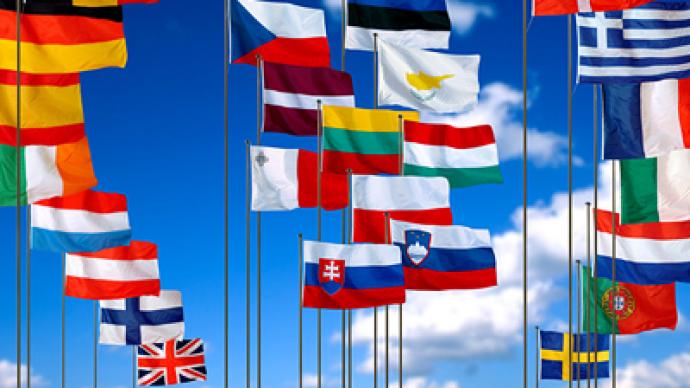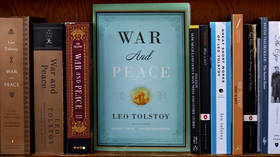Ossified EU bureaucracy sluggish in face of modern challenges – MEP

Growing EU bureaucracy is already making the union unable to solve pressing problems on the continent, so Brussels should share control with member states, argues Czech politician Jan Zahradil, MEP with the Civic Democratic Party.
RT: Mr Zarhadil you believe the EU is secretly taking new powers without telling people?Jan Zahradil: Yes, exactly. There is this idea to build up common consolidated corporate tax base. Of course for the first look it might look innocent, but if you go deep down to what is behind it – it might be the one instrument in the future that might lead to a harmonization of tax base which is something we are very strongly opposing.I can see certain risky points in that. And one particular risky point is that there are some hidden measures that might lead to further harmonization of fiscal and tax policy. We should not allow them to have such tax powers and tax jurisdiction as well as fiscal autonomy lifted up from the national level to the EU level. I think that national governments definitely should have full control over their tax policy and fiscal policy, which means social systems, pension systems, and healthcare systems. These things should not be given up in favor of European authorities or European institutions.RT: Why does the EU need urgent reform?JZ: We have to try to change the paradigm of the EU itself, because for the last 50 years the EU has been driven by integrationist or federalist paradigm, by the idea of ever closer union, by the idea that the shifting of powers upwards from national level to the European level is a good thing, without some deeper analysis of that. The time now seems to be over, and what we need now are some second thoughts on what exactly should be executed at the European level and what should be executed at the national level, and to find out the right balance between the European and the national levels.RT: Give us an example of how the EU is wasting money?JZ: First of all we have to look at, because I am a member of the EU Parliament, the expenses of the European Parliament itself. And there is one very good example and very simple example: why does the EU Parliament have two seats – one in Brussels and the other one in Strasburg? It costs an additional almost €300 million per year. If you have to move once in six weeks from Strasburg to Brussels, so, let’s have only one seat, and we can show by practical example to the people of Europe that we are able to save taxpayers’ money.RT: How is the European Union hurting business?JZ: We can see a lot of legal acts that have been adopted by the European Parliament, prepared by the European Commission, that in fact are not helping very much in the business environment in the EU, that are not very business-friendly, so to say. We would like to remove at least some of them. We would like to have a liberal free market, not a market which is bound by a never ending number of various regulations.The second example, of course, is the common foreign and security policy. You can see that it is very hard to achieve a common approach whenever it comes to some crucial question. That in fact the EU member states are acting much on their own rather than on some common basis and I think this is only natural and we should count on that.RT: We’ve seen protests in Brussels against the EU. Which of their demands do you sympathize with?JZ: It could be understandable from their point of view, from trade unions’ point of view but that does not mean automatically that they are right. They have to understand, trade unions all around Europe have to understand, that we live in times of very uneasy austerity measures. Many European governments were spending much more than they should have and now they have to make some curbs, they have to put their budgets under strict control, so I think this direction is the right one, that government should be really sober and much more decent when it comes to public expenditure, and unfortunately, probably in the foreseeable future it will be provoking some public disagreement in some segments of the population.RT: You think the euro is a fundamentally weak currency?JZ: I think that at the moment the position of the Czech Republic is very comfortable. It is a position of “wait and see”. I think we have plenty of time to wait and to see what will happen with the euro. Of course we wish the euro to be successful, we very much depend on our exports to the eurozone, but it does not mean that we should be keen to join the euro in some very short or foreseeable future. RT: Why do you warn that the decision making in the EU is not democratic?JZ: There are a lot of thoughts, a lot of debates on how to make the EU more democratic. In my feeling, the European Parliament itself is some body which can represent – to some extent – nations and the people of Europe – but not the only one. From my own feeling, the EU Council is also an institution which is very representative when it comes to representation of individual member states and nations. So, I do not like very much the fight or some kind of tension between the European Council on one hand and perhaps the European Commission of the European Parliament on the other hand. It does not serve for any good and I think these institutions should rather cooperate than compete with each other.RT: You believe the EU does not respect or listen to its smaller states?JZ: Integration is also to some extent a very emotional issue, and those countries who are so-called founding fathers of European integration might be more emotionally bound with federalist concept than those who joined later, so you can see probably more hesitancy towards the whole integration concept in those countries who joined the EU later in other waves of enlargement than amongst the original ones.RT: You are from the Czech Republic which split fairly amicably from Slovakia. Why do you think in Belgium and across the EU ethnic tensions are rising?JZ: It seems that the federal system, the system of decision making in Belgium is extremely complicated, and also there is huge transfer between the Flemish and Walloon parts of the country. And some people might like it, some not, it is very similar to what was happening in former Czechoslovakia, which was one reason for the split, for the “velvet divorce”. RT: You talk about differences between the EU member states on Libyan military intervention. What are the key differences? JZ: Any international involvement, be it UN or NATO or EU is welcome, but what we’ve seen is the EU was not very able to act on a united basis, so if at least NATO at the moment is able to act and able to cover the whole operation by its own authority – then I feel it is a good thing.RT: Between the EU and Russia: do you believe there should be more dialogue?JZ: I think that it is worthwhile, because Russia, despite the fact that it is not an EU member, it is a very important and strong country, and also a big supplier of natural resources.











